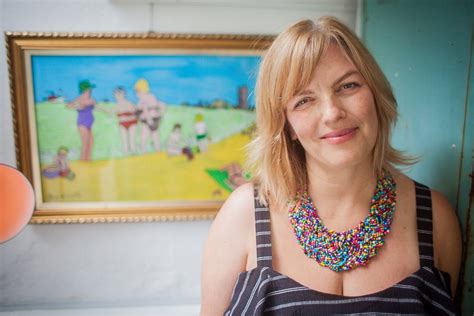A Quote by Sasha Cagen
Lists help us manage the chaos of our lives—to impose order, if only for a moment. Writing a list clears the mind. … Once everything is written down, it’s easier to see which tasks are important and in what order to tackle them. Tasks that seem overwhelming look easier when reduced to mere lines on paper.
Related Quotes
Coming up with the bucket list is the easy part, but ticking off the list is the challenge. I love a good challenge, which is why I strongly advise everyone to come up with a bucket list. It doesn't have to contain out of this world tasks. But once you have written down the list, screw it, just do it!
The pleasure of a good act is something to be remembered - not in order to feed our complacency but in order to remind us that virtuous actions are not only possible and valuable, but that they can become easier and more delightful and more fruitful than the acts of vice which oppose and frustrate them.
Someone with whom we have a lifetime's worth of lessons to learn is someone whose presence in our lives forces us to grow...those who consciously or unconsciously challenge our fearful positions. They show us our walls. Our walls are our wounds--the places where we feel we can't love any more, can't connect any more deeply, can't forgive past a certain point. We are in each other's lives in order to help us see where we most need healing, and in order to help us heal.
There are two synergistic approaches for increasing productivity that are inversions of each other:
1. Limit tasks to the important to shorten work time (80/20).
2. Shorten work time to limit tasks to the important (Parkinson's Law).
The best solution is to use both together: Identify the few critical tasks that contribute most to income and schedule them with very short and clear deadlines.
Life, as we find it, is too hard for us; it brings us too many pains, disappointments and impossible tasks. In order to bear it we cannot dispense with palliative measures... There are perhaps three such measures: powerful deflections, which cause us to make light of our misery; substitutive satisfactions, which diminish it; and intoxicating substances, which make us insensible to it.
The poem builds in my mind and sits there, as if in a register, until the poem, or a piece of a longer poem, is finished enough to write down. I can hold several lines in my head for quite some time, but as soon as they are written down, the register clears, as it were, and I have to work with what is on the paper.
Complex tasks are often better handled in the back of our mind, and that's often true of creative tasks - when you have something complex to deal with in writing or research or responding to an email. I'll start working, put it aside, and sometimes I'll wake up the next morning with a solution, or I'll find one when I exercise.





































